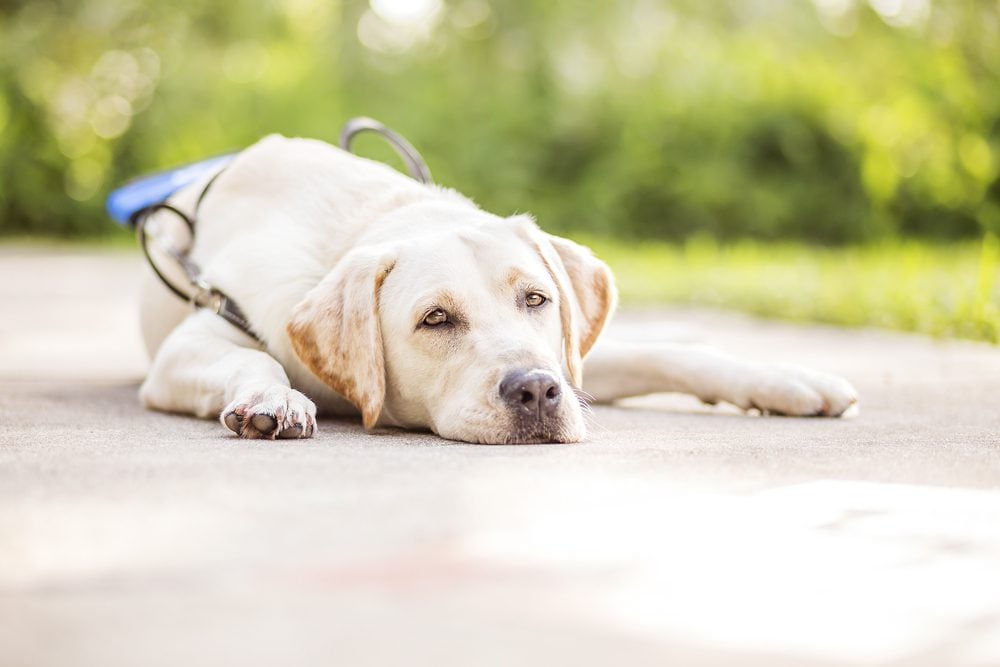Anxiety and PTSD are two of the most common mental health disorders that people struggle with daily. For some, their symptoms are manageable, but for others, coping with all the negative and scary emotions may feel like an uphill battle they are losing.
While there are a variety of treatments available for these disorders, one option would be to get a psychiatric service dog (PSD). Not only will this dog provide comfort through love and companionship, but this type of service dog is highly specialized and can perform tasks that help manage PTSD and anxiety.
Though any dog with the right disposition could be a fantastic service dog, we already know which developed breeds are likely to make the best service dogs. Especially if you plan to train your own service dog, you’ll have a greater chance of success if you choose a breed known for excelling in service work versus a pup with unknown origins.
Of course, even if you won’t be training the dog yourself, knowing about different service dog breeds is valuable. The more you know about them, the better you’ll be able to understand if a certain breed would be able to fit into your lifestyle.
Today, we’ll share information about the different types of assistance animals available and what traits to look for if you’re considering a dog for service work. Finally, we’ll provide you with a list of 10 of the best service dog breeds for anxiety and PTSD.
Types of Assitance Dogs
Before we get into our recommendations, let’s talk about the different types of assistance dogs available. Service dogs are incredibly helpful but can also be expensive and require intensive training that takes years.
Some people suffering from anxiety or PTSD may not need a service dog but could still benefit from a support animal. Here, we’ll explain each type of assistance animal so you can make an informed decision about your needs.
Therapy Dogs
Therapy dogs are typically brought to visit people in places like nursing homes, hospitals, and schools. Therapy dogs aren’t necessarily for personal use, though bringing joy to others can often benefit one’s own mental health as well.
Therapy dogs don’t require training as intense as the training service dogs go through, but they must pass the AKC’s Canine Good Citizen test to be eligible for therapy dog certification. Passing this test proves that the dog is obedient and well-mannered enough to safely interact with people in public places.
Emotional Support Animals
If a service dog is unrealistic for you, whether that be due to financial or time restraints, an emotional support animal (ESA) may be a good alternative. Emotional support animals can be any type of animal that is legal to own as a pet.
Of course, dogs make for some of the best emotional support animals due to the strong, loving bonds they can form with their owners. A dog that is serving as an ESA does not have to undergo any special training. Their presence alone can provide comfort.
To have your dog (or other furry friend) designated as an ESA, you’ll need a letter from a mental health professional. You’ll be able to use this letter as proof that you need the animal for your disorder. With this letter, you’ll be able to live with your ESA even in rentals that don’t otherwise allow pets without incurring extra charges.
Psychiatric Service Dogs
If you’re interested in getting a service dog to address anxiety or PTSD (or both), then the type of service dog you’d be looking at is referred to as a psychiatric service dog. These dogs are trained to perform a number of different tasks that help their handlers cope with symptoms.
For instance, psychiatric service dogs can apply deep pressure therapy to their handlers; they climb onto their handlers and act as a living, breathing, cuddly weighted blanket. They can also help prevent repetitive or self-harming behaviors, provide grounding, interrupt nightmares, and give their owners extra personal space via body blocking in public areas.
While many tasks relate directly to handling heightened stress or anxiety (or even panic attacks), psychiatric service dogs can also help in other ways. For example, they can give their handlers reminders to take their medication and even fetch it.
The awesome thing about service dogs is that the skills they learn can often be customized to your personal needs. This is especially true if you train the dog yourself or work directly with a trainer. Dogs from charitable organizations may also allow for some customization, but it would depend on the agency.
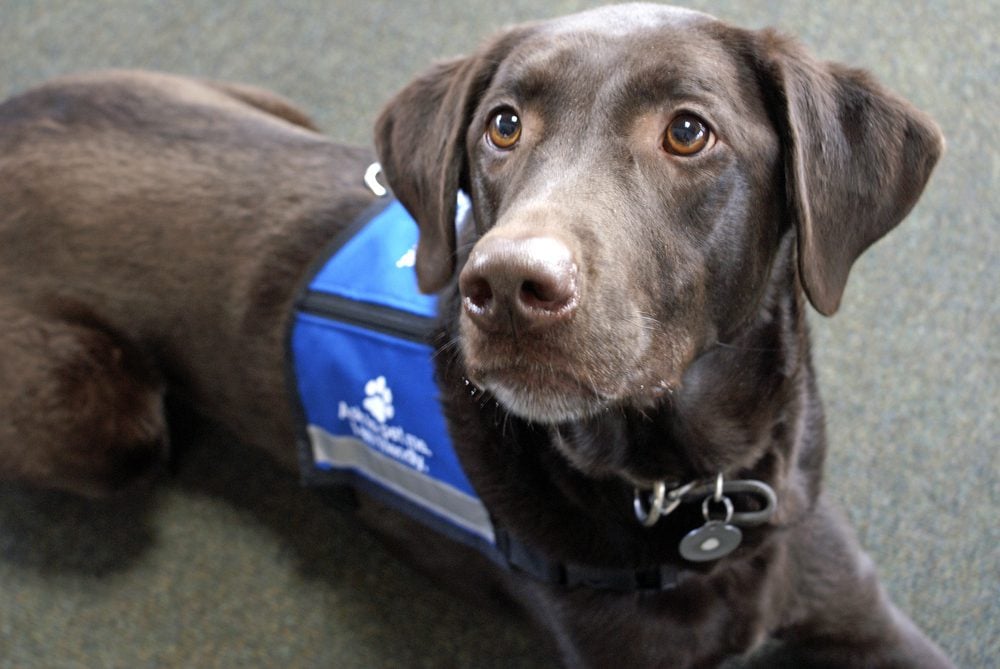


Traits to Look For in a Service Dog
Believe it or not, any dog could become an amazing service animal for PTSD and anxiety, regardless of breed. Temperament and trainability are perhaps the most important factors that make for a viable service dog.
We look at specific breeds because we can better predict what these dogs’ temperaments will be like. However, even purebreds can fail service dog training, and mixed breeds can become superstar service dogs. Let’s look at some of the traits a dog needs to become a fantastic service dog for anxiety and PTSD.
Temperament
A service dog for PTSD and anxiety should have the basic characteristics that most service dogs have, such as being friendly, calm, well-mannered, and obedient. These dogs also have to be good at focusing and ignoring distractions, though, to some extent, that can be trained. It is also quite beneficial for this type of service dog to be affectionate.
Psychiatric service dogs are both workers and companions. Though they offer aid in the form of special skills, the unconditional love and friendship they can provide also have incredible value for those suffering from mental health disorders. Therefore, breeds that are very cuddly, loving, and people-oriented can excel as psychiatric service dogs.
Trainability
Good service dogs enjoy learning and their work. Certain dogs thrive more than others when given something to do as they find completing a task and receiving praise or treats incredibly rewarding.
Eager-to-please dogs that enjoy training will be the best fit for service work. This is even more true if they happen to be quick learners. If a dog is stubborn, difficult to train, or too easily distracted, they may not be suitable for service work.
Of course, focus can be trained, and even these types of dogs may end up being diamonds in the rough, but you’re far more likely to be successful when working with a dog that is eager to do what you ask of them.
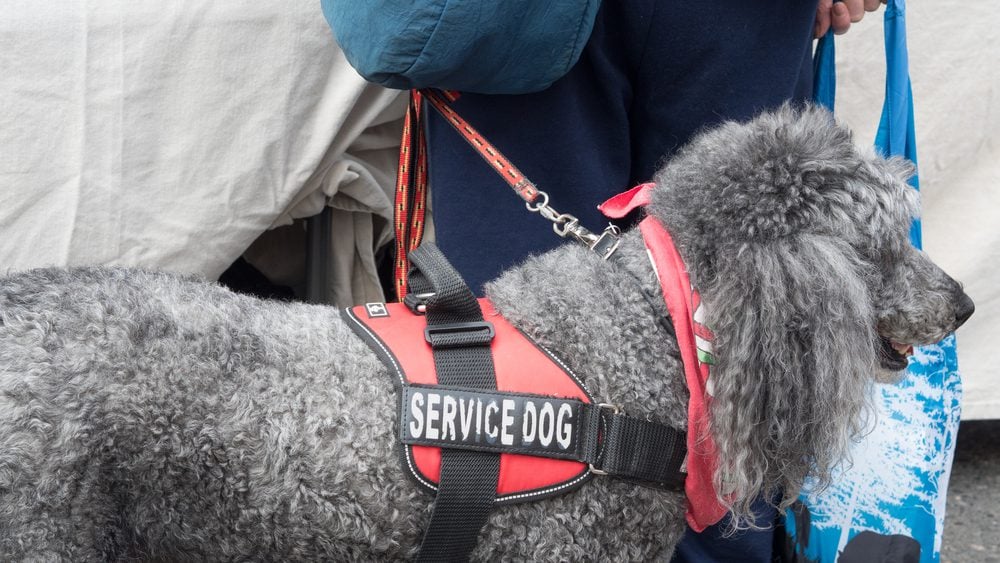


Other Considerations
It’s important to remember that dogs are a commitment, and you are fully responsible for their care. Because of this, you should consider what kind of care you’ll be able to manage. Additionally, you should be sure that the type of dog you get will suit your needs regarding service work and your lifestyle.
Grooming
Some dogs will require extra effort when it comes to grooming. This may mean daily brushing or even monthly trips to a groomer. Do you have the ability to either pay for grooming or do it yourself? If not, you may want to consider a short-haired breed over a long-haired one.
Exercise and Energy
Another thing easily overlooked when one sees the cute face of a dog is how much exercise they’ll need. Some high-energy breeds need hours of exercise daily, and if they do not get it, they can be a nightmare in the home.
Service dogs tend to get more mental enrichment than the average companion dog because they spend every day working, but they still need to be exercised. If you’re worried about a breed being too high-energy for you to manage, then look for breeds that are a little less active.
Size
Finally, you should consider the dog’s size. Can you offer enough space for a large dog? Do you have any preference about the size of the dog?
Large dogs can offer full-body hugs and deep pressure therapy, but small dogs may be less expensive to care for and easier to travel with. Either can make great PSDs, but it’s important to pick a dog that matches your needs.
The Top 10 Service Dog Breeds for PTSD and Anxiety
Now that you understand the differences between the three types of support animals and know what to consider when searching for a service dog, it’s time to get into our recommendations. Here are the ten best service dog breeds, in no particular order, for PTSD and anxiety.
Labrador Retriever
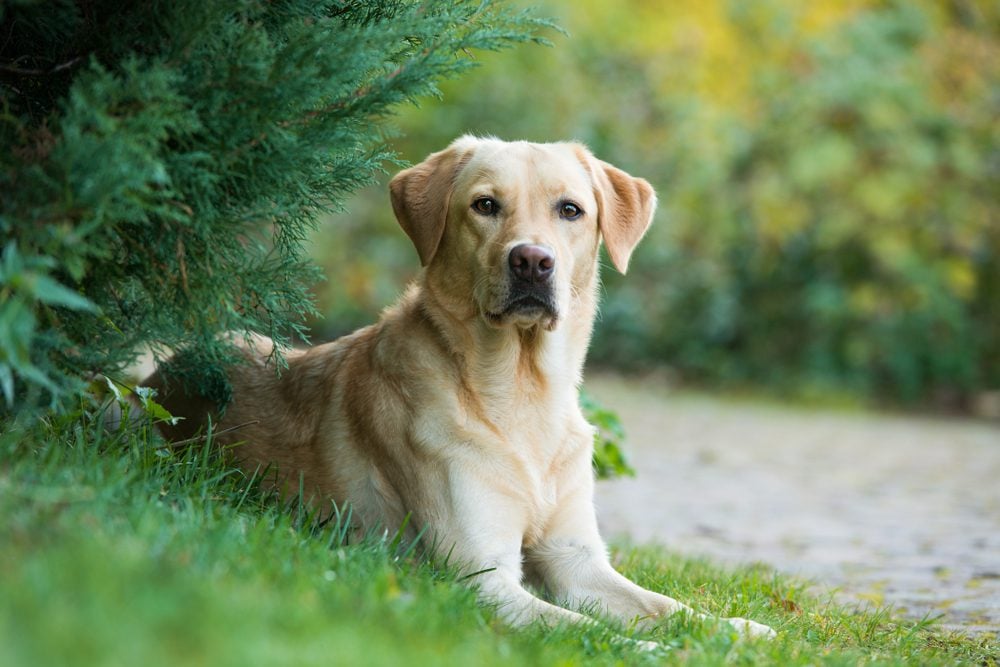


Labrador retrievers are commonly chosen for all types of service work. This is because they are very people-oriented dogs that tend to be quite obedient and highly trainable. Most Labradors love being given a job to do, especially if that job involves fetching.
Though Labs can be hyper without proper exercise and training, those that do receive a good education are generally calm, relaxed, and unbothered. This breed also tends to be quite patient and tolerant. They’re very friendly and are great with children of all ages, strangers, and other dogs.
Because Labrador retrievers adore their families, they can be steadfast friends to those struggling with PTSD or anxiety. This breed is likely to enjoy spending time with you and will likely welcome cuddles. Labradors are a large breed and would be a good size for deep pressure therapy, as well.
Golden Retriever
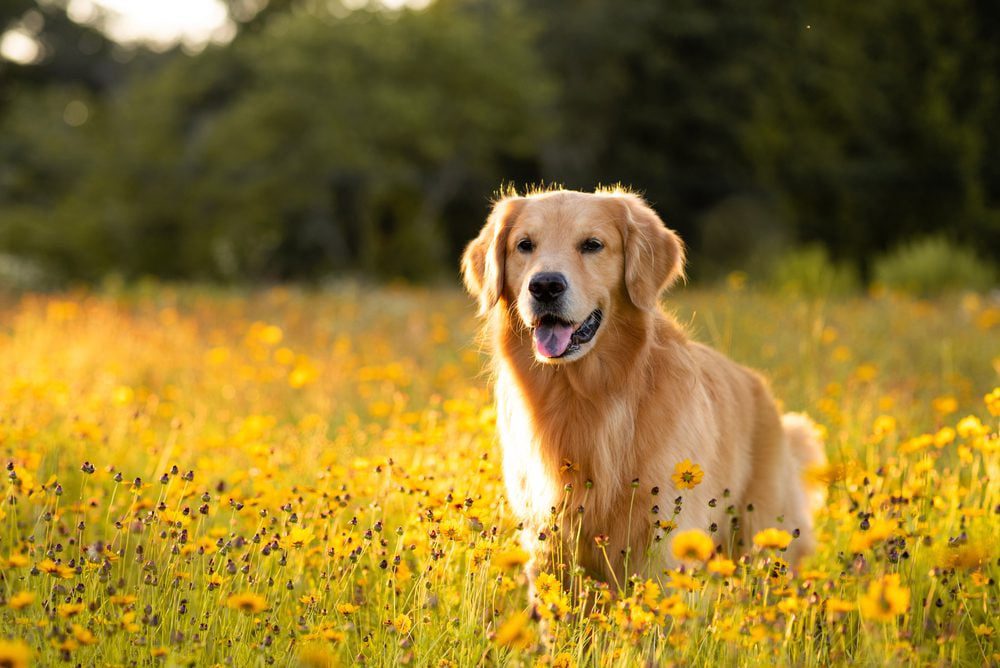


The golden retriever is much like the Labrador in that both were originally bred as hunting dogs and are commonly seen in service roles. This breed is playful, happy-go-lucky, and friendly.
They’re highly trainable and live to please, which is why they can be such great service dogs. As their name suggests, they’ll also love fetching things for you!
The golden retriever is another breed that can be quite obedient with proper training. They’re good with children and strangers and love being around people, especially their families.
If you need a dog to hug, the golden retriever will be there for you. Golden retrievers can also be taught to offer deep pressure therapy.
German Shepherd
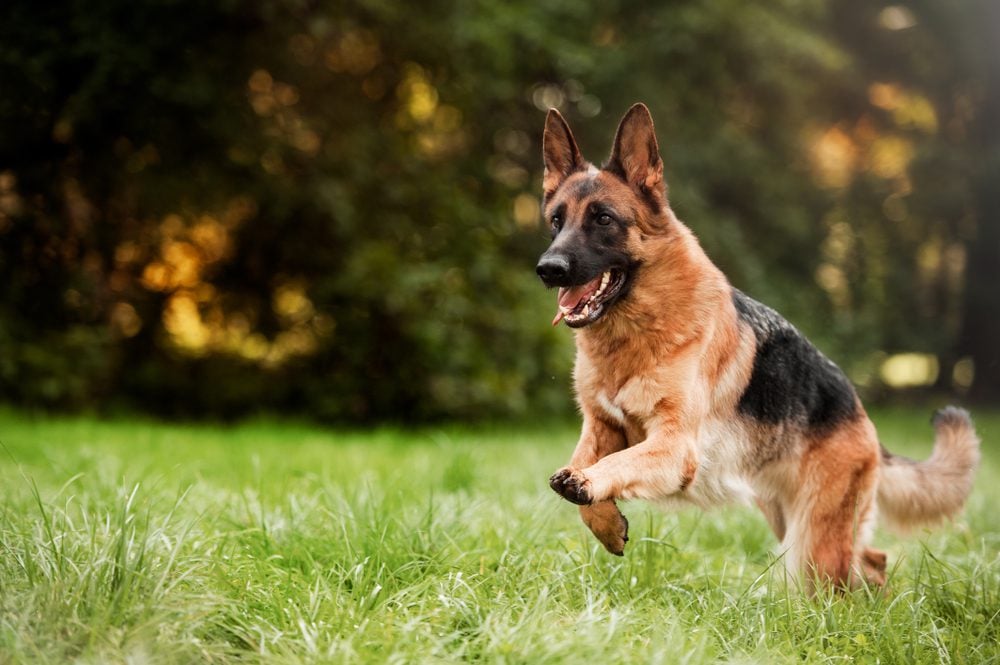


Many people think of German shepherds (GSD) as police dogs, but the breed is much more versatile! German shepherds are known for being quite intelligent, to the point where they can even become problem children if not provided with enough enrichment.
In fact, it would be fair to say that German shepherds need to be given a job to prevent boredom that can lead to destructive behaviors, as they are a high-energy breed. As such, they excel at service work and could become fantastic psychiatric service dogs.
While not as friendly toward strangers as retriever breeds, GSDs still love their families. They’re known for being loyal and even protective of their family members. So if your PTSD or anxiety makes you feel unsafe, a GSD could help.
Not only does the breed look intimidating, but they are courageous and may guard their owners if they perceive a threat. It’s important to note that an aggressive GSD could never be a service dog, and aggression should never be trained in any dog. However, even a friendly GSD may protect their owner if the situation calls for it.
Poodle
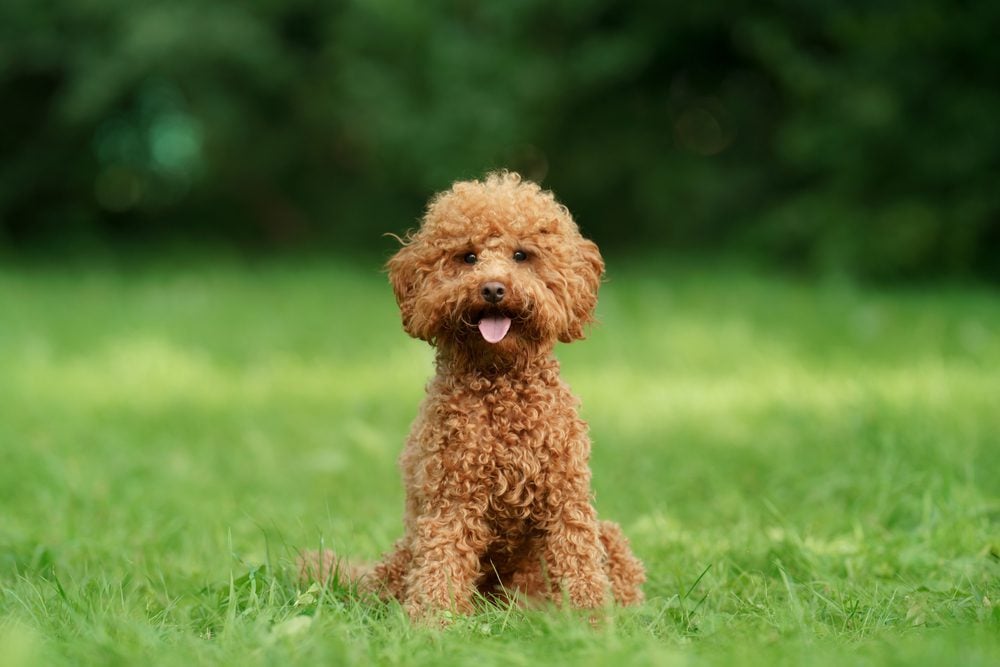


Poodles come in three sizes: standard, miniature, and toy. The breed’s temperament varies only slightly between sizes. This is a high-energy breed that can be problematic if you cannot provide enough mental and physical enrichment.
The poodle is quite an intelligent dog and is thus more than capable of learning the complex skills required for service work. They are considered eager to please and easy to train.
Poodles are good with both strangers and children and, in general, are very friendly. Despite this friendliness, they tend to make great watchdogs and may have protective instincts, though they are not aggressive. Poodles also adore their families and are affectionate. They’re a great breed that can help you feel both safe and comforted.
We can’t talk about poodles without mentioning their coat! They hardly shed. Their coat grows long and curly and requires regular clipping unless you have time to care for it daily. Though the coat is a bit more high maintenance, it is considered “hypoallergenic” as the lack of shedding is less irritating to those with allergies.
Bernese Mountain Dog
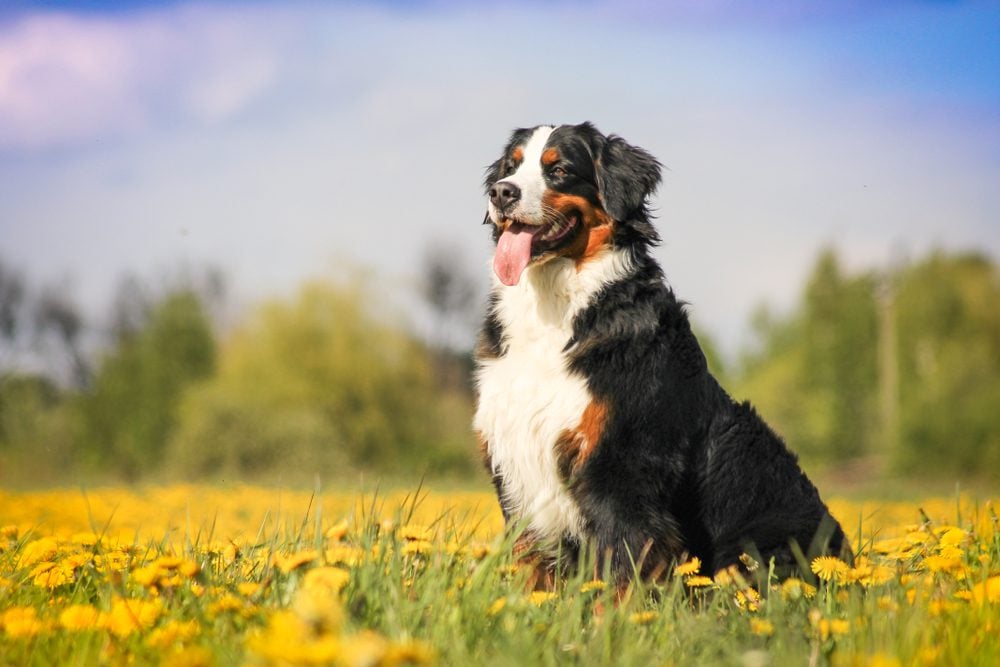


When you think of service dogs, some common breeds may come to mind, and the Bernese mountain dog probably isn’t one of them. However, this breed is quite capable of service work and is sometimes chosen to guide the blind.
Bernese mountain dogs adore their whole families but are known to develop favorites. They’re good with kids, other dogs, and strangers. They have a generally calm nature to them but still love to play.
Their large size can often intimidate others (which is great if you want to feel safer), but they are generally sweet hearts who love their owners more than anything. This dog will be happy to snuggle up against you or give hugs when you need comfort. They can provide a sturdy weight for deep pressure therapy as well.
The Bernese mountain dog is eager to please and is easy to train using positive reinforcement. This breed is quite sensitive, to the point where you can destroy your bond if you use physical punishment to train them, so be sure to keep training positive and rewarding.
Boxer
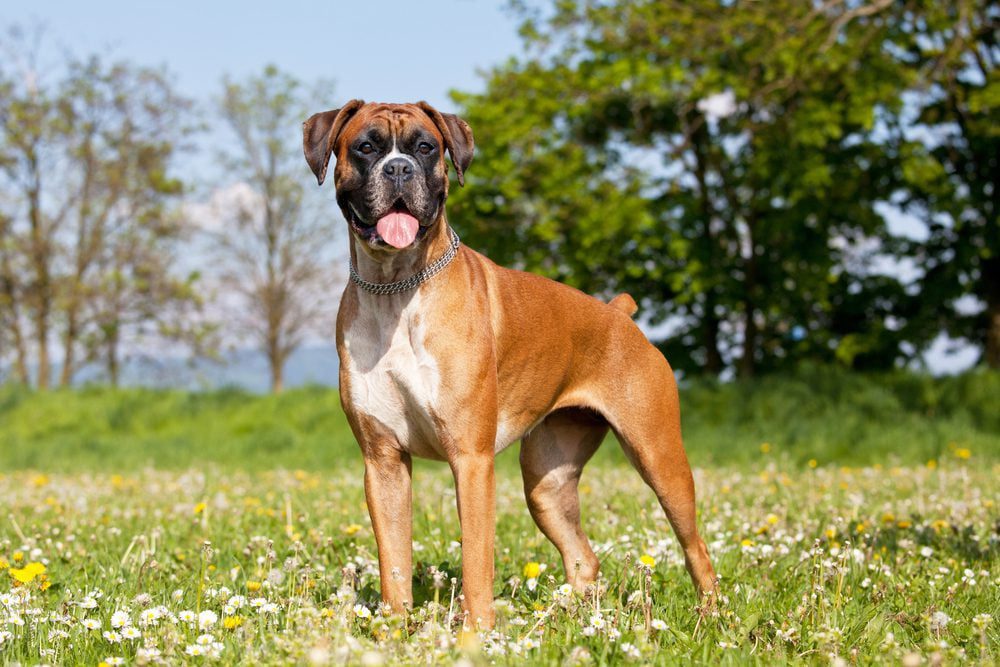


Boxers are loyal, affectionate dogs known to excel in service roles. This is because they are very intelligent and natural problem-solvers. However, while they are quite amenable to training, they may quickly tire of repetition.
Training sessions should be made interesting through the use of rewards and play, and it may be best to train in short, five-minute sessions a few times per day. Speaking of play, boxers love it—they are a high-energy breed that needs ample exercise.
For those suffering from PTSD or anxiety who struggle to feel safe, the boxer may help. This dog is courageous and a natural watchdog or family guardian. As such, the breed does require ample socialization to prevent potentially aggressive behaviors, but a well-socialized boxer can be safe and even friendly around strangers while still being protective in the face of a threat.
Boxers don’t always get along with other dogs of the same gender, which is another reason for early socialization. Along with this, it’s best to keep this breed on a leash or in a fenced-in yard with supervision. Though boxers tend to be good with kids, their exuberance and large size could be dangerous to a small child who is easily knocked over.
Border Collie
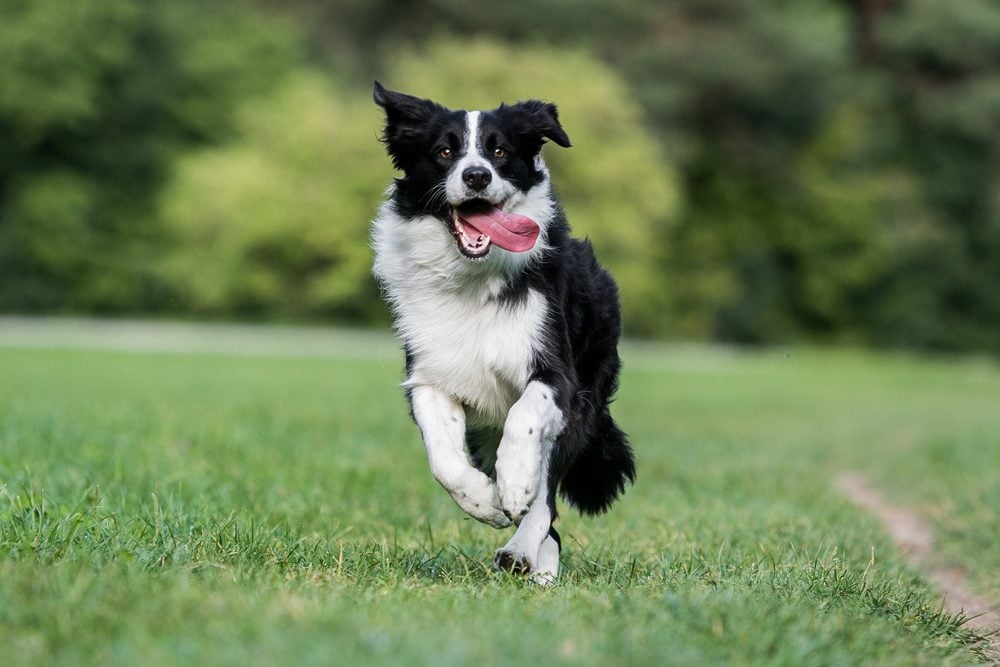


No service dog list would be complete without the border collie. This is because the breed is one of the smartest around; collies live to work and are highly trainable.
These dogs are quite loving and even cuddly with their families, but they can be a bit reserved with strangers. Being a herding breed, they have herding tendencies and do better with older children as they may sometimes try to herd little ones.
Collies are playful and incredibly athletic—they’re a very high-energy breed. While working as a psychiatric service dog would give them a job to do that helps provide the mental stimulation they so desperately crave, they may need an hour or two of exercise on top of their daily work.
Collies absolutely love to run, and teaching them to fetch can be an easy way to help tucker them out that doesn’t require much on your part. However, because collies are so smart and active, they’re easily bored. If you have the means to ensure they receive enough physical and mental stimulation every day, then they could make for an incredibly talented service dog.
Yorkshire Terrier
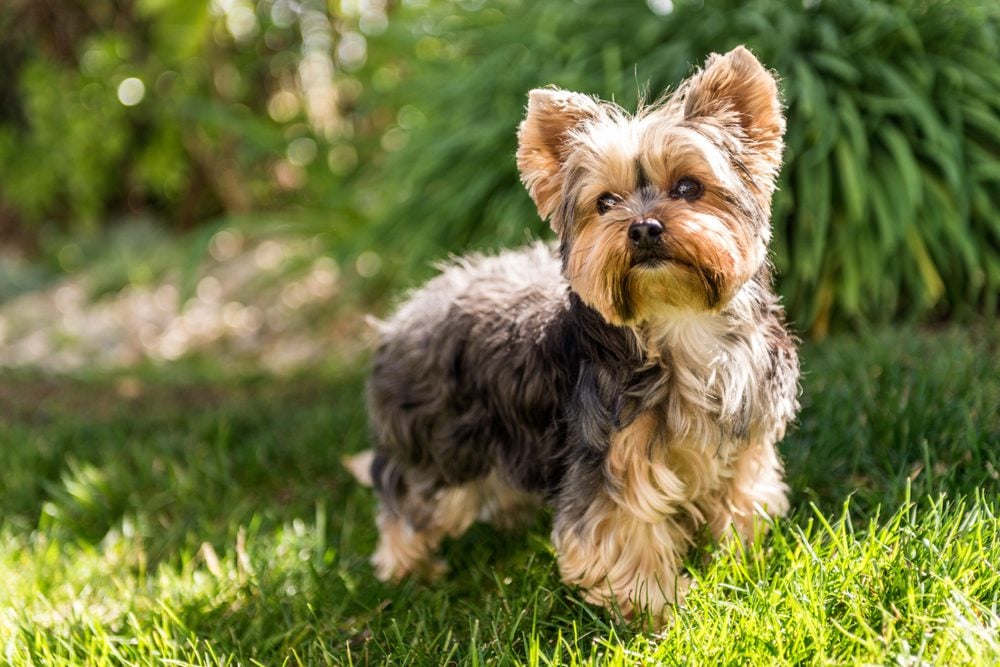


If you’re looking for a small, hypoallergenic breed to become your service dog, then consider the Yorkshire terrier. The Yorkie is a sweet, playful, affectionate breed with a big personality. This breed may be small, but they can still be rather brave and are effective watchdogs.
The Yorkie’s love for their owners, intelligence, and eagerness to please make a fantastic combination when it comes to training. This breed is easily trained and capable of learning service tasks.
Because Yorkies are so adoring toward their families, they can bring a lot of comfort to someone struggling with PTSD or anxiety. They’ll be happy to be picked up and held or to curl up on your lap and be petted.
They’re also playful and athletic enough to participate in canine sports like rally or agility. Even if you’re not interested in canine sports, having a dog that you can interact with in the form of play or exercise can also be beneficial to your mental health.
It’s important to note that the Yorkie’s coat will require regular clipping or daily care if you prefer to keep it long.
Cavalier King Charles Spaniel



The cavalier King Charles spaniel has a lot of great qualities for working with PTSD and anxiety sufferers. First of all, they’re adept at adapting to their owner’s lifestyle and can live happily in both active and inactive households.
Secondly, they were originally bred to be lapdogs and were quite popular among British nobility dating back to the 17th century. Today’s King Charles spaniels have retained their propensity for being gentle and loving and will happily sit in your lap or cuddle with you.
The breed is friendly, good with kids and strangers, and gets along well with other dogs. Cavalier King Charles spaniels only need moderate exercise and weekly brushing, so they’re a relatively low-maintenance option if you’re looking for a service dog that could easily fit into just about any lifestyle.
When you consider how sweet and affectionate this breed is, it’s no surprise that they are eager to please and thus easy to train. They can excel in a number of canine sports, including obedience, so you can expect them to be capable of learning even the complex skills required of a service dog.
Papillon
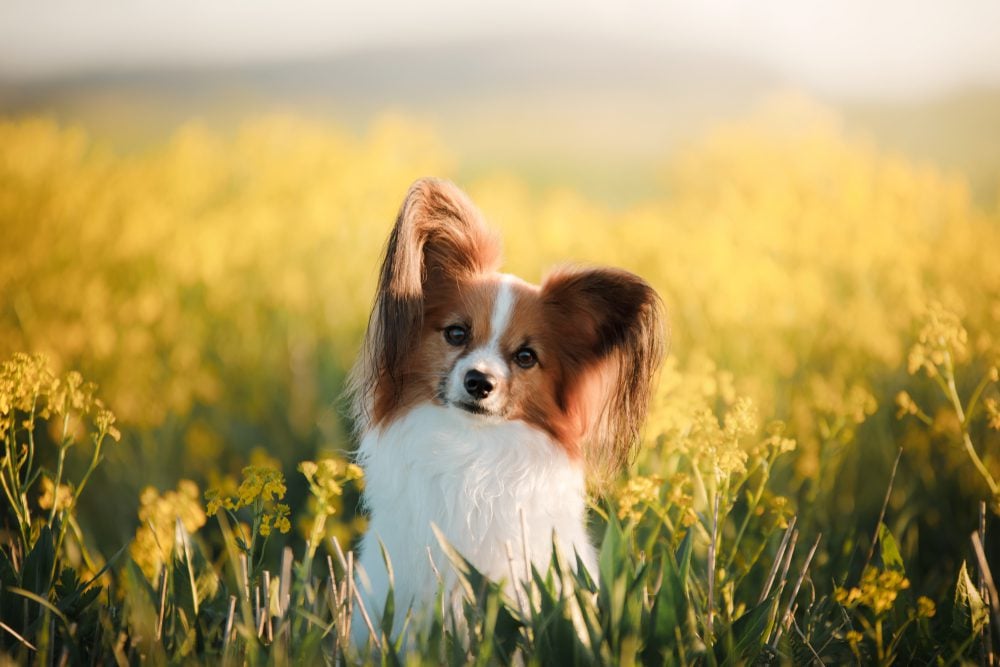


The papillon is another small breed that can excel in a service dog position because they love having a job to do. Despite being small, they are quite athletic and can keep up with an active lifestyle.
At the same time, they are an affectionate breed that can even be somewhat clingy. In fact, it is recommended that this breed not be left alone for long periods as they can develop undesirable behaviors and even separation anxiety. Good thing that a psychiatric service dog would almost always be by your side!
The strong bond papillons form with their owners is fantastic for those struggling with PTSD or anxiety, as even when the pup isn’t in their harness, they’ll want to be near and enjoy affection and snuggles.
Papillons are also pretty smart. Their love for their owners, paired with their intelligence, makes them easy to train.
You may think their long coat would be high-maintenance, but the papillon only needs to be brushed a few times per week to prevent matting. Some owners prefer to have their papillons trimmed (especially the feet), but this is mostly for cosmetic reasons.
The Best Psychiatric Service Dogs
The best psychiatric service dogs are those that fit into your lifestyle and are able to provide you with the help you need. The breed doesn’t truly matter, but the knowledge we have about purebred dogs can help people choose a dog that will be capable of service work and will suit their lifestyle.
Anxiety and PTSD can be difficult to manage, but a psychiatric service dog can provide relief through trained behaviors and companionship. Whether you’re training your own dog or getting one through an organization, knowing about breeds can help you decide what type of dog would best suit your situation and needs.
